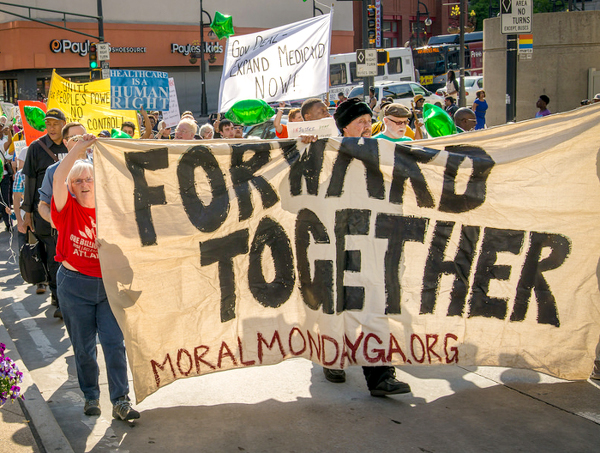
PHOTO/STEVE EBERHARDT
ATLANTA, GA — In North Carolina a growing movement has arisen to confront a government and political structure that is standing in the way of the people receiving even the most basic necessities of life. In their demands for justice and a moral society, over 900 were arrested. These acts of civil disobedience are an expression of the moral outrage over conditions which can no longer be tolerated.
The Moral Monday Movement has spread to Georgia, South Carolina, Florida and other Southern states. They find themselves confronting conditions that are virtually identical: those on the bottom – the have-nots – are seeing unemployment benefits cut, food stamps cut, drastic cuts to education, being cut off from health care, especially Medicaid –in a time when more and more jobs are being eliminated by automation, and when the jobs that remain are low-paying, part-time or temporary with no benefits. For the undocumented workers, legislation blocks any access to health care, housing, unemployment benefits, education or any kind of worker rights..
This wave of civil disobedience across the South is only part of a much larger movement developing across the country. People in Michigan are going to jail in opposition to the building of an oil pipeline that threatens the environment. Others are arrested in California and Albuquerque who oppose police violence. In Alabama 7 protesters chained themselves to the gates of a private prison holding undocumented immigrants, demanding “Not one more deportation.”
Why civil disobedience now? That same question confronted a movement in the South in the middle of the last century. At that time millions of African Americans were held in check by Jim Crow, one of the most brutal systems the world has ever known. It was illegal to sit at a lunch counter, illegal to ride in the front of the bus, illegal to seek an education, illegal to find housing or work in certain areas, and illegal to vote.
Civil disobedience was the catalyst that sparked a massive movement for change. And when the right to protest was denied, the people braved fire hoses and police dogs and beatings and bombings and went to jail by the thousands to express the aims and dreams of a movement that would not be denied.
Now, as then, we are in a time when the people are confronted with intolerable conditions, but today we face a new situation. We face a government that has merged with the corporations and is standing in the way of reform. But civil disobedience is not just a way of getting the politicians attention. It represents a fundamental change in the posture of the movement.
We will no longer beg. We will no longer be on the defensive, trying to hold on to what is already lost. Instead, civil disobedience represents a forward-leaning posture that is intent on fashioning a transformed society that is just and moral, and a government that operates in the interests of the people.
